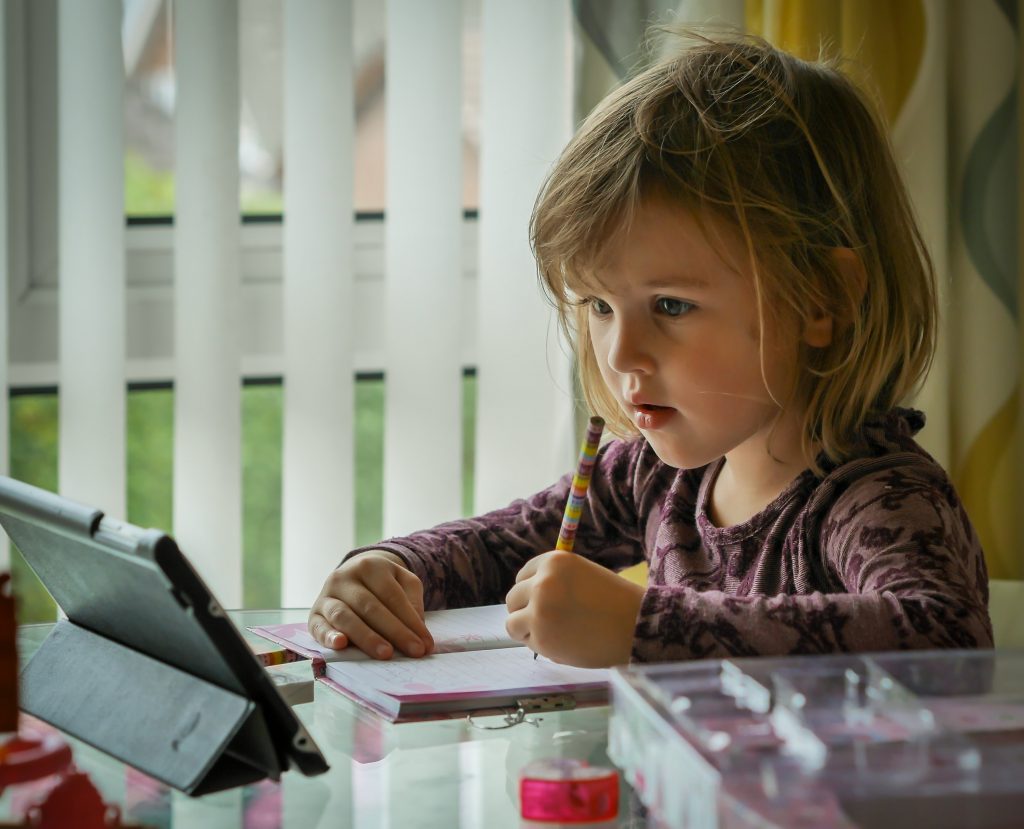Last week, my kid had a meltdown while he was at his friend’s house for a play-date after enduring the first 4 days of online learning. That caught me off-guard and made me realise that we all need to make some adjustments, mentally, maybe physically, and definitely emotionally to ease ourselves into a new routine.
Our editor Julie Wolf previously wrote a great piece titled Online School Survival Guide, which I highly recommend reading first. On top of those tips she recommended, I have discovered a few more nuanced pointers that could make a big difference for our kids’ (as well as our own) mental health. Some of these have been adapted from reatergood.berkeley.edu.

What type of learner is your child? Knowing your child’s preferences for visual, auditory, or kin-esthetic learning will help manage your expectations and anticipate potential struggles. Teachers are likely to be empathetic about your child needing to have a fidget spinner in hand, or needing to turn off their video when finishing the assigned task to minimize distractions.
That said, a simple checklist with a focus word might help your child to stay on task. For example, if the child is asked to watch a lesson, read a prompt, and then provide a written response to the prompt, the checklist would have keywords for each of these required activities: watch, read, write. The child would check off each task with you as it is completed, and receive some positive praise or another reward when finished.

Acknowledge effort. Make an effort to notice and give positive feedback about where your kids really put in the effort and did well in the past. Ask: “What do you feel most confident about?” And then help them see that it is their own effort that led to that accomplishment.
Trying to motivate kids with sticks and carrots is its own special form of parental hell. I quote from the book, The Self-Driven Child, “We really can’t control our kids — and doing so shouldn’t be our goal. Our role is to teach them to think and act independently, so that they will have the judgment to succeed in school and, most importantly, in life… our aim is to move away from a model that depends on parental pressure to one that nurtures a child’s own drive. That’s what we mean by the self-driven child.”
Without self-motivation, it’s pretty darn hard to learn. Fortunately, we can foster self-motivation in our kids by supporting their competence, independence, and their connection to others. These are the three core psychological needs that, when filled, lead to self-motivation.

Allow independence. Our kids need the freedom to fail on their own, as well as the freedom to succeed without having to give their parents credit. They can’t feel responsible for their schoolwork if we are still the organizing force behind getting it done!
Instead of instructing, ask them: “So what’s your plan?” This makes it clear that they are still in control of their own behavior, and it helps put them in touch with their own motivations and intentions. If kids aren’t asked to articulate their plan, sometimes they won’t make one. (Especially kids who are used to being nagged; those kids know that their parents will eventually get frustrated and do their planning for them.)
“How are you feeling right now?” As parents, we can help our kids identify how they are feeling. “I’m feeling anxious right now,” they might say. This is the “name it to tame it” technique that educators employ. When kids label their emotions, it helps them to dissipate.

The task here is to identify what they are feeling, not necessarily why they are feeling that way. This can be difficult. We can get attached to our narratives about why we are upset and get caught up in trying to problem-solve. But that won’t help us focus. We need to talk about the actual emotions, not the reasons for the emotions.
See if you can sum up their feelings in a simple phrase or two. For example, “You feel sad and lonely.” You could leave it at that, or throw in a little empathy: “That’s so hard. Feeling lonely is the worst.” Don’t try to “fix” their challenging emotions. The goal is to unearth and label emotions, not change them. Send your kids the message that you believe they can handle those difficult emotions. There’s no need to stuff them down.

Get social. Obviously, this is a greater challenge during a pandemic, but inviting a classmate from school over for a playdate once a week can really fill a child’s bucket. Or maybe it’s time to finally get to know your neighbors, especially if they have kids! It’s even better if you could make it an outdoor playdate so you can get some fresh air and exposure to nature, which has been scientifically proven to improve spirits. If it is truly impossible to head outside or invite friends over, you can take advantage of this time to set up more regular video calls with family and friends. Another great way to help kids build connections is to consider doing something to help others. This could mean anything from making a card for grandma for his upcoming birthday or shopping online to find the perfect Father’s Day present.
KEEP READING: Covid Creating Toxic Stress? Help The Whole Family Cope
Images: Unsplash




